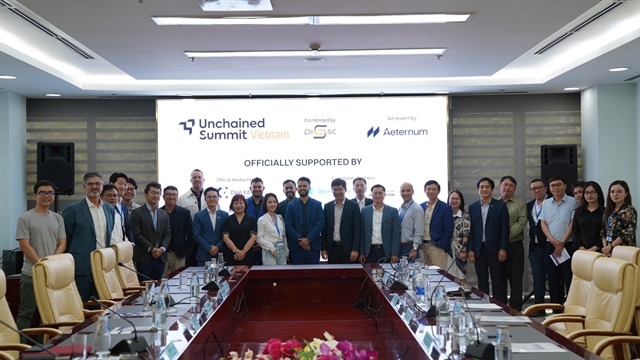 Economy
Economy

 |
| Deputy Prime Minister Trần Hồng Hà and fellow delegates view an exhibition booth. — VNS Photo Mai Hương |
By Mai Hương
QUẢNG NINH — Opening the fifth National Forum on Digital Enterprises Development 2023 (VFTE 2023) on Monday in Quảng Ninh Province, Minister of Information and Communications Nguyễn Mạnh Hùng underscored the significance of the Make-in-Vietnam movement, particularly in the semiconductor industry, to Việt Nam's development during the digital transformation era.
Since its inaugural session in 2019, VFTE has become a major event for the industry, serving to summarise and evaluate the progress of Vietnamese digital technology enterprises in the past year. It aims to convey core ideas about digital technology development, the spirit of Make-in-Vietnam, and digital applications to enhance revenue, profit and labour productivity.
Under the theme "Innovating Digital Applications for Economic Development - Driving Economic Growth and Labour Productivity," Minister Hùng reported encouraging developments and achievements in the past four years.
The number of digital technology businesses in Việt Nam increased by 30 per cent, digital technology industry revenue rose by 32 per cent, and the proportion of Made-in-Vietnam products in the digital technology industry increased from 21 per cent in 2019 to 29 per cent in 2023. Specifically, the field of software production for foreign markets experienced a growth of 43 per cent, with over 1,400 businesses operating in this sector.
"Việt Nam not only assembles and processes products, but also innovates and solves Việt Nam’s problems, going global from here," Hùng emphasised, highlighting that self-reliance is unattainable without products being made in Việt Nam.
He affirmed that the most crucial aspect of digital economic development is digital applications and the digital transformation of various sectors and networks. Leading this effort should be digital technology businesses, as Việt Nam boasts the necessary infrastructure, technology, skilled workforce, and understanding of digital transformation to pioneer innovative applications across various sectors.
"Vietnamese digital technology businesses now have a new mission: industrialisation and modernisation of the country through the innovation of digital applications and digital transformation for various sectors," Hùng said.
Semiconductor industry a golden opportunity for Việt Nam
According to the head of the Ministry of Information and Communications, the development of the semiconductor industry is an opportunity for Việt Nam to revive its electronics industry.
In 2024, the focus will shift towards commercialisation, nationwide 5G development to establish infrastructure for industrial applications, and development of narrow AI applications for specific sectors. It will also mark the first year of implementing the national semiconductor industry development strategy.
"The semiconductor industry is a foundational sector and, more importantly, a critical national industry for the next 30-50 years," Hùng said. He highlighted Việt Nam's fundamental advantage in human resources which will eventually lead to becoming a global semiconductor industry hub.
According to Nguyễn Văn Khoa, CEO of FPT Corporation, the development of the semiconductor industry is also an opportunity for Việt Nam to rebuild its domestic electronics industry, especially as it transitions to AI and IoT-enabled electronic devices. The semiconductor industry is the core of the digital transformation industry, the largest market for semiconductor chips.
Khoa pointed out that the chip is the lifeblood of the modern economy, especially as the world relies on technology and innovation. While the design segment of the chip industry has a relatively small value of around $50 billion, the entire electronics industry (one of the 10 largest industries globally) had a market value of nearly $3.5 trillion in 2022, estimated to reach nearly $5 trillion by 2030.
In 2022, semiconductor manufacturing industry revenue was $600 billion, projected to reach $1 trillion by 2030, with a 15 per cent annual growth rate in the 2024-25 period, especially for high-performance GPU chips for AI.
In Việt Nam, the total export turnover of the electronics industry reached $114 billion in 2022, constituting 30 per cent of the country's total export revenue. New free trade agreements offer favourable conditions for Việt Nam's electronics industry, but how many Vietnamese companies contribute to this industry is a concern of industry insiders.
According to Khoa, Việt Nam has the conditions to seize this golden opportunity based on favourable factors such as open foreign diplomacy, being a bright spot for FDI attraction, being a political centre in Southeast Asia, and having a suitable workforce (with an affinity for science, intelligence and STEM). Particularly, the strong government support for the semiconductor industry's development is a crucial factor.
The Việt Nam semiconductor market is expected to grow by around 6.7 per cent during 2023-28, reaching $1.94 billion. The country should focus on design, packaging and testing in the short term, production in the medium term, and mastering core technology in the long term, Khoa suggested.
Distinctive character of Make in Vietnam
At the forum, Deputy Prime Minister Trần Hồng Hà emphasised the need to build an innovative ecosystem, led by digital economic enterprises.
Deputy PM highlighted the expansive landscape for digital economic development, propelled by Việt Nam's established national strategy targeting a minimum of 20 per cent GDP from the digital economy by 2025 and 30 per cent by 2030. Currently, the digital economy contributes 16.5 per cent to the national GDP.
Deputy PM underscored global trends shifting towards a knowledge-based economy, combining human knowledge with digital transformation, and a green transformation, both reliant on digital technology. Despite past missed opportunities, Việt Nam, armed with numerous advantages, must show determination in seizing the fourth industrial revolution.
The utilisation of digital data and smart connectivity are pivotal in this transformation, marking a shift from traditional resource-centric models to digital data-centric economic development.
"The businesses seizing this opportunity bring about significant changes for Việt Nam to have distinctive products of its own. The Vietnamese government identifies digital technology as a new space, a new production force, and a new resource to enhance labour productivity, serving as a driving force for economic growth," he said.
On the government's side, the Deputy PM affirmed that the government will assist digital technology enterprises in both legal frameworks and by being the largest procurer to create market demand for businesses. The government will lead and initiate the digital economy, but businesses, along with the Ministry of Information and Communications, need to develop a cohesive concept and solutions to establish the market and create outlets for products. — VNS




